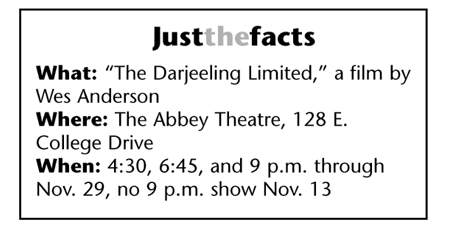|
| ||||
| Spoiled Americans abroad
by Judith Reynolds A year after their father’s death, the brothers Whitman travel to India loaded down with family baggage. Figuratively and literally. In Wes Anderson’s latest attempt at satire, “The Darjeeling Limited,” three privileged American siblings trundle across a curry-colored continent with 11 pieces of their father’s designer luggage. Emblazoned with the initials LJW, the matching leather suitcases are numbered and embossed with rows of running animals. Among the many not-so-disguised metaphors in this cliché-ridden film, running is one. The brothers are either staring at the camera in a self-absorbed stupor or running – to, from, for, or after something – a train, a vendor who has cheated them, a hot woman, a handy sand hill or a foaming ditch. And those fancy bags seem to be in just about every frame. That they were created for the film by none other than high-end Parisian designer Louis Vuitton is no surprise. Product placement never had such high gloss. Expect to see matching sets in Fifth Avenue showrooms before Christmas. With such a blatant symbol for “family baggage,” what can you expect? But then again, props are everything. This is a coming-of-age road movie with various symbolic objects on the highway linking adolescence to adulthood. Two others stand out: a $3,000 pair of shoes and a $6,000 belt. Does that frame the picture better for you? Well, adulthood may be a stretch. Francis Whitman (Owen Wilson) and his younger brothers, Jack (Jason Schwartzman) and Peter (Adrien Brody), are a bunch of upper-crust twerps on what used to be called a lark, a little escapade to see one corner of the world. I hate to tell you this, but they don’t grow up. Francis, the quintessential older brother, is a bossy, controlling, know-it-all. From the beginning you know his pre-planned, so-called spiritual quest will flounder. He wants to create something that never existed among the disconnected siblings – friendship. One tactic Francis uses to ensure that his brothers won’t abandon him is to confiscate their passports. Nice traveling companion; they might want to escape his insufferable eminence. The meek acquiescence of the lower two is another pitiful cliché, as is the multitude of secrets they keep from each other, as if they were still 9 years old. The boys bicker about who has the father’s razor, sunglasses, car keys and the two biggest parental prizes – love and favor. They allude to their mother (Angelica Houston) who didn’t attend the funeral and apparently doesn’t care about them either. And they have little notion or respect for the country they are traveling in. Perhaps to heighten this unsympathetic portrayal of not-so-innocent Americans abroad, the director places the Whitmans in poverty-stricken India. That gives the film a whiff of colonialism. Add the stench of American triumphalism when the boys stumble on a potentially tragic accident. The brothers spot three village boys (parallel brothers?) who fall into a turbulent ditch. Briefly and uncharacteristically, the Whitman boys behave like mature men. They awaken from their narcissistic haze and manage to save not quite all of the kids. In a slow motion march, they return hand-in-hand to a stunned village. Before you can sing “For he’s a jolly good fellow,” the village welcomes the Whitman brothers as if they are heroes and invites them to participate in an elaborate, all-white funeral. How’s that for a sugary plot twist? Methinks Anderson was aiming for dark comedy. But therein lies the problem. Like his earlier films (“Rushmore,” “The Life Aquatic,” and the best of the lot, “The Royal Tennenbaums”), the director seems to have satire on his mind, especially the rich minefield of family dynamics. But half-baked satire isn’t the real thing. When it fails, it fails spectacularly. Anderson’s ironist leanings would have been better served if he had included a native point of view. We get a glimpse of that when a polite but angry train steward reminds the trio of smokers about their no-smoking compartment. In general, the Whitmans ignore or skirt rules. These are the little infringements performed by an entitled class that only serve to make you dislike them more. For example, in a quintessential tourist moment, Peter buys a poisonous snake. Of course, the snake escapes on the train, endangering everyone on board. What a laugh. Hey, Mom, I thought it would make a fun pet. Finally, the steward, the real hero of the movie, boots the Whitman boys off the train. Applause? Not from the audience I was with. Anderson’s dilettantes have been enshrined in the failed, frat-boy hall of fame. Even the director’s deadpan approach and false melancholy (too many straight-on shots of the central trio and a hit-or-miss musical score) cannot save this film. But you know the ending. Running for the final train, why not shed some baggage and enter adulthood? If you didn’t see that sappy resolution coming, you weren’t paying attention. •
|



